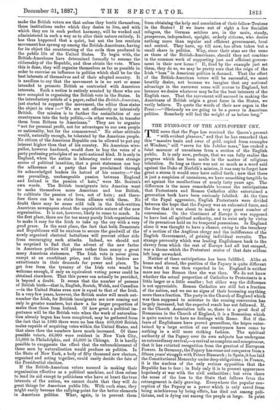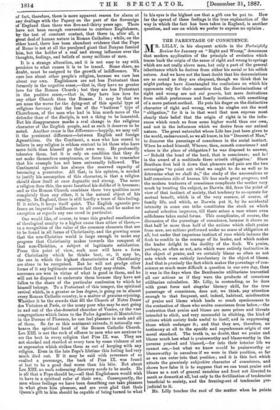THE DYING-OUT OF THE ANTI-POPERY CRY.
THE news that the Pope has received the Queen's present "with evident pleasure," and that he has remarked that this "massive basin and ewer of gold, copied from examples at Windsor," will "serve for his Jubilee mass," has evoked a faint murmur of uneasiness from a section of the English public. It is only now, perhaps, that we can fully realise the progress which has been made in the matter of religions toleration. So long as there was not so much as a word said against the Duke of Norfolk's mission, it was easy to forget how great a storm it would once have called forth ; now that there is just a suspicion of uneasiness, we have something tangible to set against the recollections of nearly forty years ago. The difference is the more remarkable because the anticipations that Protestants and Roman Catholics alike entertained a generation back have been curiously falsified. At the time. of the Papal aggression, English Protestants were divided.
between the hope that the Papacy was an exhausted force, and, the fear that it was about to make a very great number of. conversions. On the Continent of Europe it was supposed.. to have lost all spiritual authority, and to exist only by virtue of its precarious hold on its temporal possessions. In England alone it was thought to have a chance, owing to the treachery of a section of the Anglican clergy and the indifference of the English Government, of gaining individual recruits. The strange perversity which was leading Englishmen hack to the slavery from which the rest of Europe had all but escaped, was a theme which the Protestant orator of that date seldom. left long unworked.
Neither of these anticipations has been fulfilled. Alike at. home and abroad, the position of the Papacy is quite different from what it was then expected to be. England is neither more nor less Roman than she was then. We do not know whether the actual proportion of Catholics to Protestants is a little larger or a little smaller ; but either way the difference is not appreciable. Roman Catholics are still but a fraction of the nation, and we see no signs of their becoming anything more than a fraction. The party in the Church of England which was then supposed to minister to the coming conversion has largely increased, but the expected result has not followed. If, as the Church Association tells us, there is a great deal of Romanism in the Church of England, it is a Romanism which is quite content to have no dealings with Rome. But if the: fears of Englishmen have proved groundless, the hopes enter- tained by a large section of our countrymen have come to nothing in a still more striking fashion. The spiritual authority of the Papacy over its own subjects has undergone an extraordinary revival,—a revival so complete and conspicuous, that it has extorted recognition from the greatest of European Powers. In Germany, the Papacy has come out conqueror from a fifteen years' struggle with Prince Bismarck ; in Spain, it has laid the Constitutional Monarchy under deep obligations ; in France, it is the nucleus of the only serious opposition that the Republic has to fear ; in Italy only it Is to present appearance hopelessly at war with the civil authorities ; but even there the sense of the loss to the State that follows from the estrangement is daily growing. Everywhere the popular con- ception of the Papacy as a power which is only saved from being mischievous by being effete, has died out among poli- ticians, and is dying out among the people at large. In point
of fact, therefore, there is more apparent reason for alarm at any dealings with the Papacy on the part of the Sovereign of England than there was five-and-thirty years ago. There have not been enough conversions to convince Englishmen, by the test of constant contact, that there is, after all, a great deal of human nature in Roman Catholics ; while, on the other band, there has been abundant evidence that the Pope of Rome is not at all the paralysed giant that Bunyan fancied him, but the holder of a real and strong influence over the thoughts, feelings, and beliefs of many millions of men.
It is a strange alteration, and it is not easy to say with precision to what causes it is to be traced. Some share, no doubt, must be assigned to the growth of indifference. We care less about other people's religion, because we care leas about our own. Englishmen are not less Protestant than formerly in the negative sense,—that is, they have no greater love for the Roman Church ; but they are less Protestant in the positive sense,—that is, they have less love for any other Church than the Roman. It may be that we are none the worse for the dying-out of this special type of religious fervour; that the loss of the "buttress" type of Churchman, of the man who had in him much more of the defender than of the disciple, is not a thing to be lamented. But his disappearance marks a real change in the religious character of the English people, and as such it deserves to be noted. Another cause is the difference—happily, we may call it the persistent difference—between English and foreign Agnosticism. On the Continent, a man who has ceased to believe in any religion is seldom content to let those who have more faith than himself go their .own way. He professedly tolerates them, but it is only on condition that they do not make themselves conspicuous, or force him to remember that his example has not been universally followed. The Continental agnostic has always the reserved capacity of becoming a persecutor. All that, in his opinion, is needed to justify his assumption of this character, is that a religion should show itself at once dogmatic and strong. The more a religion does this, the more fanatical his dislike of it becomes; and as the Roman Church combines these two qualities more completely than any other, it is the natural object of his enmity. In England, there is still hardly a trace of this feeling. If it exists, it keeps itself quiet. The English agnostic pro- fesses an impartial indifference to all creeds, and he makes no exception as regards any one creed in particular.
One would like, of course, to trace this gradual amelioration of theological enmity to a higher cause than either of these,— to a recognition of the value of the common elements that are to be found in all forms of Christianity, and the growing sense that the non-Christian world is large enough to make any progress that Christianity makes towards the conquest of that non-Christian, a subject of legitimate satisfaction. From this point of view, each man will have a form of Christianity which he thinks beat, or, it may be, the one in which the highest characteristics of Christianity are alone to be recognised. But he will not grudge other forms of it any legitimate success that they may obtain. Such successes are won in virtue of what is good in them, and he will not be disposed to underrate them because they have not fallen to the share of the particular confession to which he himself belongs. To a Protestant of this temper, the spiritual revival which, in a greater or less degree, is going on in almost every Roman Catholic country, is a matter of genuine rejoicing. Whether it be the crowds that fill the Church of Notre Dame des Victoires at Paris, or the many poor who may be met going in and out of the else-deserted churches of Venice, cr the vast coagregationa which listen to the Padre Agostino di Montefeltro in the Duomo of Florence, he can feel pleasure in each and all of them. So far as this sentiment extends, it naturally em- braces the spiritual head of the Roman Catholic Church. Leo XIII. is not the rock of offence to men who are anxious to see the best in every religion that Pins IX. was. They are not shocked and startled at every turn by some violence of act or expression which strikes them as out of keeping with any religion. Even in the late Pope's lifetime this feeling had very much died out. If it may be said with reverence of so exalted a personage, the bark of Pius IX. was found at last to be a good deal worse than his bite. But about Leo XIII. no such redeeming discovery needs to be made. He is all that a Pope should be,—all that Englishmen would wish to have in a spiritual ruler of their own. Consequently, the men whose feelings we have been describing can take pleasure in what gives him pleasure, and are even glad that their Queen's gift to him should be capable of being turned to what in his eyes is the highest use that a gift can be put to. How far the spread of these feelings is the true explanation of the way in which the fact has been taken in England, is another question, and one on which we prefer to express no opinion .







































 Previous page
Previous page